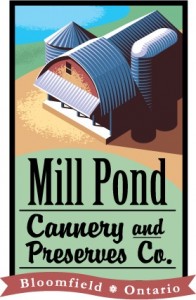Mill Pond Cannery
Brief description of the organization/business
Mill Pond Cannery and Preserves Company is a business based in Prince Edward County. Their business philosophy is based on support for high quality ingredients grown in Canada. Their initial five products, a line of fruit butters, use
 exclusively Ontario-grown fruit, such as pears, peaches, plums, cherries and apples, honey from Ontario apiaries. The company showcases the growers, farmers and producers who provide the ingredients for our products. Products are based on traditional recipes, using ingredients with no additives, preservatives or colouring and don’t contain any refined sugar, high-fructose corn syrup, or artificial sweeteners.
exclusively Ontario-grown fruit, such as pears, peaches, plums, cherries and apples, honey from Ontario apiaries. The company showcases the growers, farmers and producers who provide the ingredients for our products. Products are based on traditional recipes, using ingredients with no additives, preservatives or colouring and don’t contain any refined sugar, high-fructose corn syrup, or artificial sweeteners.
What do you think are the most pressing food and agriculture issues facing Ontario?
The company believes that the most pressing issue in the Ontario food business is the lack of small scale processing infrastructure for the fruits and vegetable in this province. While there are processors utilizing Ontario fruit and vegetable inputs, they are large scale and have no interest in small runs for smaller specialty or small batch food companies.
What policies could best address these issues?
Policies to support regional processing facilities that meet the needs of their surrounding food sheds. These facilities should be nimble to new ideas and product requirements. This could spawn innovation niches in the Ontario food industry and strengthen the growing ranks of innovative farmers and producers. Setting up a processing facility is very expensive so there would have to be cooperation from all levels – producers, processors regional, provincial and federal governments.
What role do you see Sustain Ontario playing to address these issues?
Sustain Ontario can continue its important role in creating synergies with all levels of the food equation. Activities could include things like educating the public of about the food-related issues in the province, and bringing together farmers, processors and governments to share ideas, experiences and disseminate the information to hopefully create solutions for strengthening “Made in Ontario†food systems.
